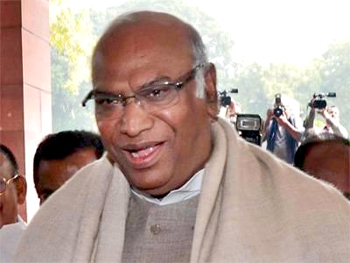New Delhi, Nov 4: Leader of Congress in Lok Sabha Mallikarjun Kharge has been inducted into the three-member selection committee which will select the Chief Information Commissioner.
 As per file notings, Prime Minister Narendra Modi, who heads the panel, has nominated Defence Minister Arun Jaitely besides Kharge to the committee.The decision to include Kharge has been taken on the advice of Law Ministry as there was lack of clarity on the Leader of Opposition in Lok Sabha.
As per file notings, Prime Minister Narendra Modi, who heads the panel, has nominated Defence Minister Arun Jaitely besides Kharge to the committee.The decision to include Kharge has been taken on the advice of Law Ministry as there was lack of clarity on the Leader of Opposition in Lok Sabha.
The RTI Act requires that selection of the Chief Information Commissioner be done by a three-member panel comprising the Prime Minister, who shall be the Chairperson of the committee, Leader of Opposition in Lok Sabha and a Cabinet Minister to be nominated by the Prime Minister.
"For the purposes of removal of doubts, it is hereby declared that where the Leader of Opposition in the House of the People has not been recognised as such, the Leader of the single largest group in opposition of the Government in the House of the People shall be deemed to be the Leader of Opposition," the Act says.
The file notings accessed by activist Commodore (Retd) Lokesh Batra show that the Lok Sabha Secretariat had conveyed to DoPT on June 19, 2014, that "as on date, there is no Leader of Opposition in Lok Sabha. Indian National Congress with a strength of 44 mmbers is, however, the single largest party in opposition to the Government in Lok Sabha.
"As per the information received from the party, Mallikarjun Kharge is the Leader of Indian National Congress in Lok Sabha which is the single largest party in opposition in Lok Sabha."
After receiving the response, DoPT had referred the matter to Law Ministry seeking to know whether leader of single largest party can be "treated" as leader of "single largest group" in the Lok Sabha for the purpose of the RTI Act?
"Our answer to the query is in the affirmative. We, however, clarify that this answer is only for the limited purpose of the RTI Act [explanation below Section 12(3)] and not for any other purpose," the Law Ministry said in its advice to Department of Personnel and Training.
The Law Ministry had also made it clear that the term "single largest group in opposition", as mentioned in the RTI Act, is not defined either in the RTI Act, Acts pertaining to functioning of MPs and Parliament and compilations of "Directions by the Speaker of Lok Sabha".
It said it relied on the response of the Lok Sabha Secretariat saying Kharge was the leader of Congress which was the single largest party in opposition.
The Department of Personnel and Training (DoPT), the nodal ministry for RTI matters, has invited applications from the people in a given format before November 24.
According to the Act, the Chief Information Commissioner (CIC) shall be a person of eminence in public life with wide knowledge and experience in law, science and technology, social service, management, journalism, mass-media or administration and governance.
All the CICs appointed so far have been retired bureaucrats. The position has been lying vacant after Rajiv Mathur, former Chief of Intelligence Bureau, retired on August 22.






Comments
What's up, just wanted to mention, I loved this post.
It was helpful. Keep on posting!
Also visit my page - Tamer Ugurluel: https://www.cihan.com.tr/tr/index/tamer-ugurluele
Add new comment